Defra has published its much-anticpated Resources and Waste Strategy today (18 December).
Headline policy proposals include the prospect of separate food waste collections for every household and an overhaul of the packaging producer responsibility system.
Follow our live blog for up-to-the-minute reactions to the policy announcement.
Refresh this page throughout the day for the latest responses.
More on this story: Gove promises end to ‘offshoring’ of waste
Strategy: Defra sets out food waste actions
Packaging waste ‘immediate priority’ in Defra strategy
Strategy: Read the full strategy here
What’s your view? Email your thoughts on the recycling and waste strategy to news@letsrecycle.com
Timeline: what are the important dates?
11.55 The Resources and Waste Strategy sets out the major policy direction for government on waste and recycling over the coming decade, but much of the detail is set to be revealed in the New Year – with consultations expected on a number of the key components of the strategy, including a deposit return scheme, overhaul of the packaging producer responsibility system and greater standardisation of recycling collections.
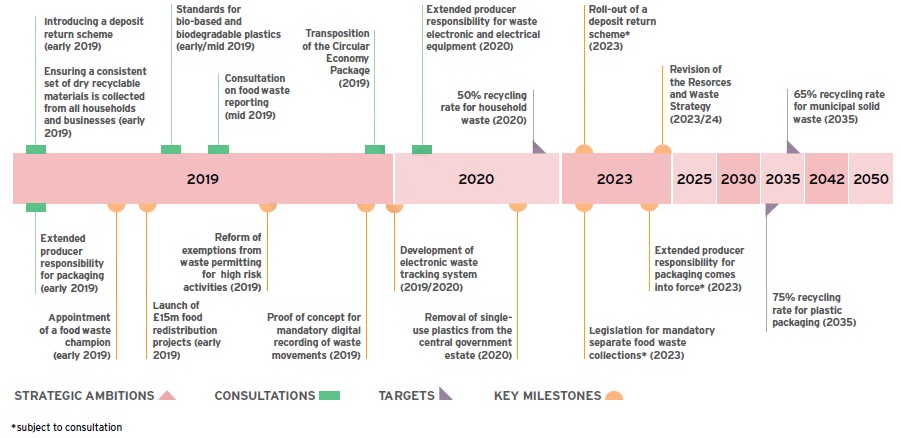
The above table details some of the expected timetable for the ambitions and further actions set out in the strategy. See our lead story for more analysis.
FCC: ‘encouraging’ statement on EfW
11.45 FCC is among the waste and resources management companies to express optimism over the direction outlined in the waste strategy. In particular the company said it is encouraged by the ‘commitment’ to energy from waste shown within the strategy.

Paul Taylor, FCC
Commenting on the publication of the Waste and Resources Strategy today, Paul Taylor, chief executive at FCC Environment, said: “This Strategy marks an important step forward in how we view our waste. With last week’s news that recycling rates have fallen, there’s clearly an urgent need to relook at our approach, and we welcome the ambitious plans Defra has laid out to make the UK a more resource efficient nation. It seems that they have listened to our views.
“In particular, we are encouraged to see a commitment Energy from Waste technology as a way to divert waste from landfill, and an increased focus on reuse, which has been a much-overlooked part of waste policy for many years.
“It is imperative that we leave our planet in a better state than we found it and we hope that this Strategy goes some way to starting to that. We look forward to working with Government to deliver on the commitments it has outlined.”
More on the potential policy implications for the EfW sector and landfill (see letsrecycle.com story).
Veolia: ready to invest
11.40 Michael Gove visited Veolia’s MRF in Southwark to officially launch the strategy.
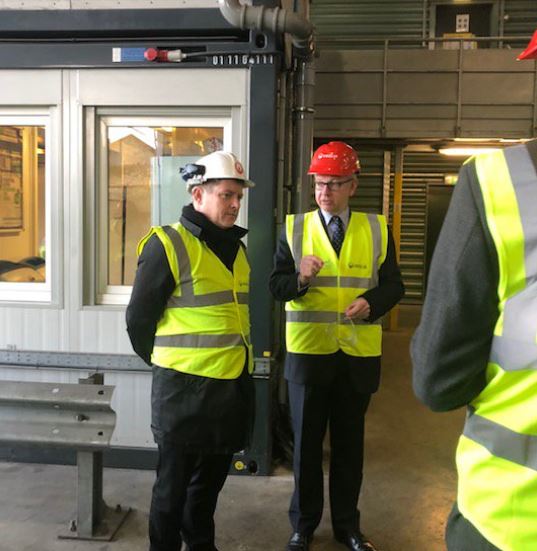
Richard Kirkman of Veolia (left) with the Environment Secretary Michael Gove
Veolia has welcomed the direction set out in the policy document, claiming that the promise of more consistent local authority recycling services will deliver benefits for the recycling and waste sector.
Speaking alongside Mr Gove today, the company’s chief technology and innovation officer, Richard Kirman, said:
“The government has listened to industry and these steps have the clear potential to dramatically change the way the sector operates to increase recycling and recovery rates.
“With consistent collections and advanced facilities like this at Southwark more recyclable materials can be collected for reprocessing into new products. As a business we are ready to invest, to take advantage of new technology, build more infrastructure and work with brand owners and local authorities to harness resources on an industrial scale.
“It’s the direction we have been hoping and waiting for, and with the public and businesses playing their part the UK can build a sustainable future.”
Suez: Palmer-Jones welcomes ambition
11.04 David Palmer-Jones, chief executive of Suez recycling and recovery UK, has welcomed the strategy as an ‘ambitious step change in the nation’s journey towards a circular economy’ as well as providing positive signals for businesses, consumers and the environment.

David Palmer-Jones, chief executive of Suez
He said: “At its core, this strategy demands better coordination between all of those involved in the production and management of waste – from product-design to retail, consumption, collection and recycling or reuse – and will empower businesses across the value chain to work together, helping consumers to make sustainable choices regarding the things they buy and throw away.
“We are particularly pleased to see Defra’s backing for a Full net Cost Recovery model of producer responsibility, which outpaces European counterparts, although welcome the fact that businesses will be asked to help determine the detail of this through consultation early next year. If done correctly, this could provide better funding for council and commercial waste collection and sorting services, which would improve recycling, while minimising the cost to consumers and tax payers. It should also lead to greater harmonisation of services, which makes life easier for consumers.
“Making producers fully responsible for the cost and collection of products and packaging will put Britain back among the world leaders for attaining higher recycling rates and driving out waste. The strategy rightly, however, seeks to give business some say in how this can be most effectively implemented to achieve environmental goals without inflating costs.
“We also welcome the new policy of mandatory separate food waste collections although, again, welcome the fact that Defra will consult local authorities to determine the detail of implementation.”
Manufacturers: concerns over cost
10.57 Proposals to have producers cover the ‘full cost’ of the disposal and recycling of their products feature prominently in the strategy.
Whilst welcoming some of the proposals outlined in the strategy, Roz Bulleid, head of climate and environment policy at EEF, the manufacturers’ organisation, said that producers of goods were keen to engage with government further on the detail.
Speaking today, she said: “Manufacturers are keen to play their part in the circular economy and are pleased to finally see more detail from government on its plans. More consistent waste and recycling collections and better product labelling should help lead to an improvement in the quality of recycled material, making it a more promising option for manufacturers.
“However, EEF’s members will be concerned about the potential cost implications of some proposals, particularly around extended producer responsibility, mandatory guarantees and extended warranties, and anxious to engage with government on the detail of its plans.”
Conference: Unwrapping the waste strategy
10.50 letsrecycle.com is running a one-day conference to discuss the details and next steps from the Resources and Waste Strategy.

Taking place on 14 February 2019, at the Trades Union Congress Centre in London, the conference will unpick some of the finer details from the Strategy and look at the route ahead for the resources sector.
Speakers confirmed so far include the Advisory Committee on Packaging, Defra, ESA, LARAC and the Recycling Association.
To register your interest in the conference, and to receive more details, email events@letsrecycle.com.
Ecosurety: welcome focus on Extended Producer Responsibility
10.40 Leading the reaction from the Producer Compliance sector, Ecosurety’s policy manager Robbie Staniforth, said:“The need for reform in the waste and recycling sector is something that Ecosurety have long been campaigning for and on this basis we welcome the release of today’s ambitious Resource & Waste Strategy.

Robbie Staniforth, Ecosurety
“Of particular note to Ecosurety and its members is Defra’s prioritisation of a public consultation on existing Extended Producer Responsibility (EPR) regulations. We are encouraged that Defra has listened to the industry’s call for more material streams to be included. New, improved EPR legislation and an expansion into sectors such as textiles, tyres and mattresses could have a significant impact on how the UK both consumes goods and how it recovers valuable, recyclable materials.
“It must be noted that new EPR channels will require adequate investment. In this way, the UK’s recycling infrastructure will be in a position to handle an expansion into new sectors. Without investment we will remain reliant on export channels for our recycling. This would reduce traceability and compromise UK recycling and environmental integrity.
“Ecosurety welcomes Defra’s decision to give the recycling sector the opportunity to feed into a framework that will set the direction of travel for resources and how they’re recycled for at least the next decade – or even the next quarter of a century. We also welcome the clear timings that the report outlines in the context of its ambitious plans. Rather than opting for a ‘best of a bad bunch’ approach in the consultation, Ecosurety will seek to deliver the very best solutions for the UK’s recycling sector. In this way we can adequately meet the vision for a more circular waste economy which the Resource & Waste Strategy indicates is a key priority.”
Biffa: emerging opportunities for investors
10.30 According to Michael Topham, chief executive of Biffa, one of the UK’s largest waste management companies, claims that the strategy offers an opportunity to ‘transform’ the sector, with up to £8 billion of potential investment ready to be unlocked.

Michael Topham, chief executive of Biffa
He said: “Increased investment in the UK’s recycling services and infrastructure is essential if we are to meet the government’s new targets. This strategy highlights both the emerging opportunities for private investors, as well as promoting new funding support mechanisms through measures like deposit return schemes and reform of the packaging waste recovery note (PRN) system.
“We have already created better end markets for items like PET drinks bottles and HPDE milk containers – our Biffa Polymers plant processes these extremely successfully and we’ve recently announced a further £15m investment in a similar PET facility near Sunderland – but we need more. This strategy will hopefully act as a catalyst to generate new infrastructure investment into plants for recycling, energy-from-waste schemes and, where necessary, safe disposal.
“We’ve also been calling for separate food waste collections for a long time so it’s positive to see this now included, as it is in Scotland, Wales and Northern Ireland. As regards other separate recycling collections, it will be important to consider the benefits of models currently used, allowing for appropriate mixed recycling collections, which have proved to be successful.
“Now government policy has been set out, we must work together across supply chains and public and private sectors to move from short-term, interim initiatives to fundamental, long term actions. We look forward to working with customers and policy-makers in the coming months as specific consultations on PRN reform, deposit return schemes and collection consistency are rolled out.”
Retailers: investment in recycling infastructure and transparency ‘key’
10:20 A number of measures included in the strategy are likely to impact the retail sector, including potential reform of the PRN system and implementation of a DRS system as well as the doubling of the 5p carrier bag charge.
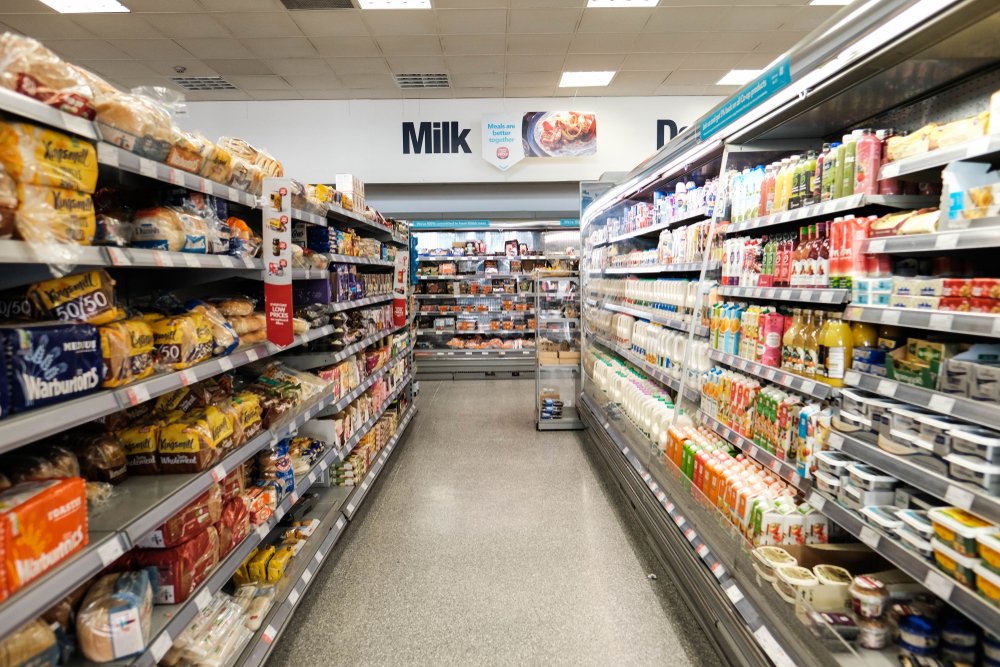
Reform of the producer responsibility regime for packaging is likely to see producers cover a higher proportion of the cost of recycling of their products
Andrew Opie, director of food and sustainability at the British Retail Consortium says that in order to improve public confidence in recycling more transparency over funding and income from recycling will be necessary.
He said: “Retailers and consumers want to see a world with no plastic pollution and high levels of recycling; we, therefore, welcome a strategic approach to boosting the country’s recycling rates and waste management. Retailers are already making good progress towards this by removing, reducing and improving packaging, but we need Government coordination and investment to build our recycling capacity and consistency, and ensure local authorities have the support to help us all recycle more.
“However, the public must also be given further reassurances that the materials they are putting into their recycling bins are actually being recycled. The Government must be clear that the revenues raised from businesses through the proposals outlined will be reinvested into recycling infrastructure.”
On PRNs, he added: “Retailers want to do the right thing and know they have a responsibility to contribute more directly towards the costs of recycling and recovering packaging, alongside their work with suppliers in reducing packaging and removing plastics. We support a review of PRN to one that incentivises best practice – one that rewards retailers who use packaging that is easily recycled and disincentivises the use of less recyclable materials.”
ESA: welcome boost for recycling
10.10 Waste industry trade body the Environmental Services Association has described the strategy as a ‘welcome boost’ for recycling.

Jacob Hayler, ESA
If implemented well, the new government strategy could set a long-term framework that supports more investment and jobs in vital recycling and recovery services and infrastructure, the organisation said.
Following the launch of the Strategy, ESA’s executive director, Jacob Hayler, said: “It’s important to understand that policy decisions in this important area can make a real difference to the economy. We now have the opportunity to boost recycling and cut waste – creating over 50,000 jobs with £8 billion private sector investment in the process – but for this to happen the high-level ambition in the strategy will need to be turned into detailed actions that matter”
Viridor: important policy framework
10.05 Resources and waste firm Viridor has said that the strategy will act as an ‘important framework to guide future investment’.
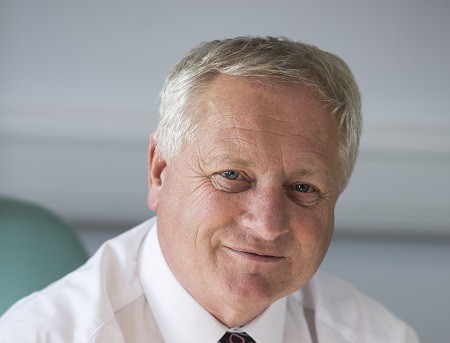
Phil Piddington, managing director of Viridor and chair of the ESA
Responding on behalf of the company, managing director Phil Piddington, said: “We welcome the direction set out in the strategy and are pleased that the government has listened to much of our and the wider industry’s representations. We are pleased to see the adoption of the ‘producer pays’ principle to cover the costs of recycling, steps to get plastics producers to include more recycled content in their products, and recognition of the role energy recovery plays in a balanced system. A more consistent approach to council collections and further measures to combat waste crime are also very welcome.
“This blueprint for the future helps to provide greater certainty for planned investment. Viridor will continue to play a leading role in support of the UK’s resource and energy efficiency goals, putting more recycled material back into a low carbon, circular economy.”
LGA: funding key to standardised services
09.45 The strategy includes a focus on waste from both businesses and councils. On behalf of local authorities, Cllr Martin Tett, environment spokesman for the Local Government Association said that funding will be key to achieving standardisation in recycling and waste collections.

Cllr Martin Tett, LGA
Cllr Tett said: “The LGA has long called for businesses and manufacturers to pay the full cost of recycling or disposing of their packaging, and we are pleased the Government has listened to us.
“Councils have been successful in increasing recycling levels and, alongside government, recognise that even more needs to be done to boost recycling to reach national targets and even higher standards.
“But moves to standardise waste services, including weekly food collections, need to be fully funded. Not every council area is currently able to recycle everything due to long-term contracts being held with different companies with different infrastructure available. Therefore, upfront funding is vital to making this work.
“It is crucial that any new system is phased in over time and still allows councils to determine how their local services work for residents, and takes account of the differences between inner city and rural areas.”
“Councils look forward to working with government to get any new recycling system right for residents.”
Creagh: ‘kicking the can’
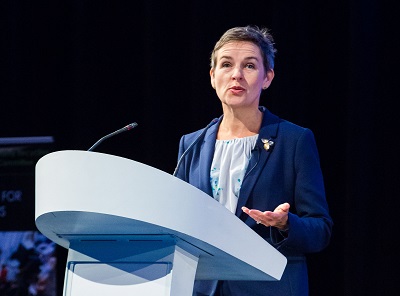
Mary Creagh MP
09.29 Mary Creagh, the Labour MP and chair of the Environmental Audit Committee has criticised the timelines for action set out in the strategy.
Responding to the strategy this morning, she said: “The government appears to be kicking the waste can down the road yet again. The plastic bottle deposit return scheme promised in 2018 won’t be ready until 2023. Textile waste piling up in landfill won’t be tackled until even later. With scientists warning we have just 12 years to tackle climate change, this strategy is too little, too slowly.”
The post Resources and Waste Strategy – live reaction appeared first on letsrecycle.com.
Source: letsrecycle.com Waste Managment


